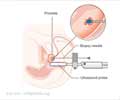Prostate cancer among men who have undergone radical prostatectomy (RP) and who were obese and had metabolic syndrome were associated with an increased recurrence of the disease.

‘More focused follow-up care needs to be given to men with prostate cancer following radical prostatectomy (RP).’





Biochemical recurrence was defined as two consecutive prostate-specific antigen (PSA) measurements of ≥0.2 ng/mL after prostatectomy, which is indicative of recurrent prostate cancer."Obesity and metabolic syndrome have become increasingly widespread in our society," said Arash Samiei, MD, basic scientist and clinical researcher at the Department of Urology at the Allegheny Health Network in Pittsburgh.
"Prostate cancer is the most common cancer in men, and up to 30 percent of patients will develop recurrence after RP. We wanted to investigate the association between obesity and metabolic syndrome with the oncological outcome following prostate removal."
Samiei explained that previous studies linking high body mass index (BMI) and metabolic syndrome to increased risk of recurrence following RP have been controversial. To build upon previous research, Samiei and colleagues performed a large study with long-term follow-up to conduct a more comprehensive analysis.
Samiei and colleagues conducted a retrospective study of all RPs (1,100 surgeries) performed by two surgeons at Allegheny General Hospital in Pittsburgh between 2003 and 2013. They analyzed Gleason score, pathologic stage, pre-operative PSA, biochemical recurrence time, surgical margin status, and metabolic factors, such as fasting glucose, triglycerides, cholesterol levels, including HDL, pre-operative BMI, and blood pressure.
Advertisement
Metabolic syndrome positivity was determined using the World Health Organization (WHO) classification, where at least three out of the following five factors are simultaneously present in an individual - insulin resistance or type 2 diabetes, obesity, high cholesterol or low HDL levels, high triglycerides, and hypertension.
Advertisement
Among the patients studied, 34 percent were obese, as defined by BMI, and 19 percent had metabolic syndrome.
Samiei and colleagues found a higher percentage of obese patients in the high-risk group (41.2 percent of high-risk patients) compared to obese patients in the low/intermediate group (32 percent of low/intermediate risk patients).
Additionally, biochemical recurrence was higher in patients with BMI ≥ 30 (32.4 percent) compared to patients with BMI <30 (16.9 percent). Finally, patients with metabolic syndrome had more than the four-fold increased risk of biochemical recurrence compared to those without metabolic syndrome.
"Our study indicates that prostate cancer patients who are obese or have metabolic syndrome undergoing RP may have a higher chance for recurrence of the disease, and these individuals should have more focused follow-up care," said Samiei. "By preventing metabolic syndrome, men with prostate cancer may have a higher chance of a favorable oncological outcome following surgery."
Samiei noted that because this was an observational, retrospective study, future work should include the design of large, multi-center prospective studies.
This study was sponsored by the Western Pennsylvania Prostate Cancer Foundation. Samiei declares no conflicts of interest.
Source-Eurekalert















